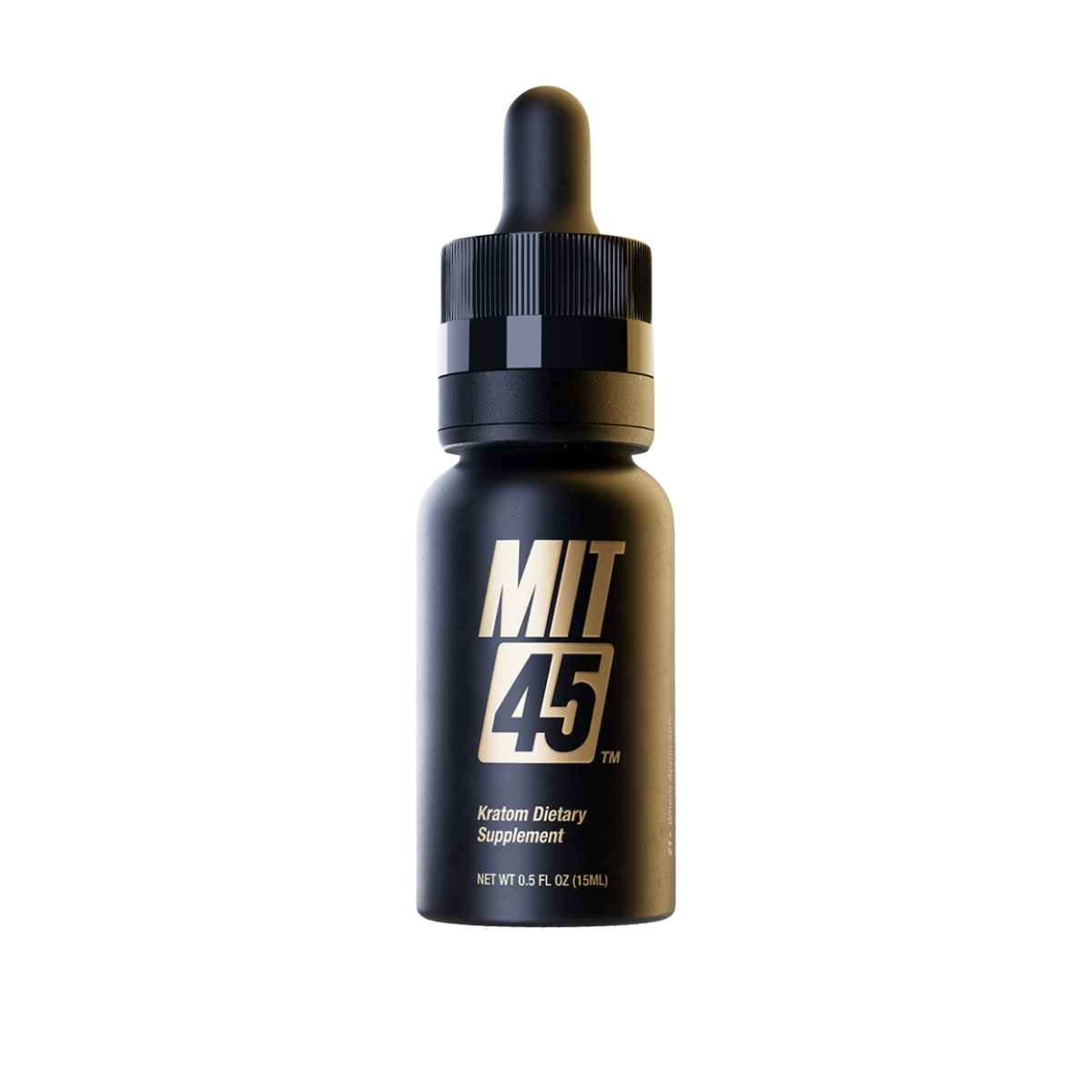Looking to improve gut health? You aren’t alone. Recent research is proving what many people already know—that what’s going on in the gut affects brain health, immune function, and beyond.
Read on to find out just how gut health impacts wellness. Plus, get tips for improving your gut health naturally.
At MIT45, we provide high-quality, natural kratom for people who care about their health. There is minimal research on kratom and gut health, but it is important to monitor your gut health while using kratom because of the potential for sluggish bowel activity while using kratom.
Let’s make sure your gut is as healthy as it can be so that you can enjoy the benefits of kratom without having to worry about any negative impact on your gut.
What is Gut Health?
While there isn’t a universal definition for the word “gut,” most people use the term to reference a specific area of the digestive system (also known as the gastrointestinal tract or GI). Digestion starts in the mouth and continues down through the intestines, and the body completes a lot of steps along the way.
The word “gut” most often refers to the large and small intestines, where many vitamins and minerals are absorbed. More broadly, “gut” is used to include other abdominal organs, such as the stomach, that are involved in the digestive process.
“Gut health” typically refers to the health status of the intestines. Within the small and large intestines, “good” bacteria help to break down food and keep the microbiome balanced. Much of the work of absorbing nutrients happens in the gut, making it crucial that this part of the body is functioning properly.
Understanding the Microbiome
A microbiome is essentially a bacterial environment. It contains a mix of “good” and “bad” bacteria. Too many harmful bacteria are considered unhealthy and can lead to disease.
The gut has its own microbiome! On a microscopic level, helpful microbes (those “good bacteria) contribute to maintaining a healthy gut. The microbiome can be affected by everything from eating choices to medications, so it’s important to make informed decisions when it comes to keeping your gut in tip-top shape.
How Does Gut Health Impact Wellness?
Understandably, a lot of important body functions live close to the gut. In fact, some experts affectionately call the gut the “second brain” because of the gut-brain connection. This is because key chemicals for nervous and immune system activity exist in close proximity to the gut.
In other words, gut health is linked to mood, immunity, and other important body functions. Studies looking into the gut-brain axis, or how the gut and brain communicate, suggest that poor gut health may contribute to depression and anxiety. It’s also thought to have an effect on behavior, emotion, and attention.
In terms of immune health, it’s thought that nearly 75-80% of immune cells exist in the gut. The microbiome helps to stimulate immune function, and also plays an important role in breaking down potential toxins in the body. Basically, immunity and gut health are believed to be closely linked, so it stands to reason that poor gut health can open the body up to all kinds of health threats.
Benefits of Good Gut Health
The benefits of good gut health go far beyond improved mood and better immunity. Recent research suggests that a healthy gut may encourage healthy aging and longevity.
It may go without saying, but a balanced gut microbiome can also help decrease the amount of digestive discomfort you are experiencing. For example, improved gut health may help get rid of unwanted bloating.
Additional benefits of having great gut health:
- Improved digestion and nutrient absorption
- Strengthened immune system
- Better mental health
- Weight maintenance
- Reduced risk of some diseases
- Healthier skin
3 Ways to Improve Your Gut Health Naturally
Fortunately, if you don’t feel like you have good gut health right now, it’s never too late to start making improvements! The following tips can help you revitalize your gut naturally, with no harsh medications necessary.
1: Introduce a Probiotic
Probiotics are a special type of “good” bacteria found in food and supplements. These bacteria are often produced during fermentation. You may have heard that foods like yogurt or kimchi are good for you, and this is precisely why!
Research shows that a diet rich in probiotics can help to restore proper microbial balance.
2: Eat More Fruits & Vegetables
Fruits and vegetables are some of the most nutrient-rich food options. Ultra-processed foods are linked with inflammation and irritation in the gut, while plant-based foods (like fruits and vegetables, grains, nuts, and seeds) are associated with intestinal improvements.
Fiber is important to digestion, even though it’s technically a nutrient that can’t be digested by the body. Essentially, fiber takes longer to pass through the body and can keep you feeling full for longer. It also gives “good” gut bacteria something to feast on, and is associated with reducing inflammation and preventing chronic disease.
3: Practice Proper Sleep Hygiene
Surprisingly, your body does a lot of digestion and gastrointestinal upkeep at night. If you’re unable to get a full night’s sleep, your gut’s goals may be sidelined.
Poor sleep can interfere with appetite hormones, which can cause a greater propensity for late-night snacking. If this habit continues over time, it’s possible to develop obesity. Researchers have found that obesity may be related to significant changes in the gut microbiome.
Basically, a good night’s sleep is associated with having a healthier gut, while poor sleep is thought to thwart beneficial microbial efforts.
Kratom & Gut Health
Curious about kratom and digestion?
Unfortunately, there is not much available research into how kratom and the digestive system may affect one another. Scientists are still developing studies to see whether botanicals, like kratom, can alter the microbiome for the better.
Similar to other substances, when kratom is abused or used in quantities outside of expert recommendation, cases of digestive discomfort are reported. For example, using kratom without expert direction may cause constipation, diarrhea, nausea, or vomiting.
It’s important to be aware of recommended serving sizes, track your kratom use, and monitor your body’s reaction to have a positive experience and avoid digestive discomfort.
Practicing good gut health may allow you to use kratom more regularly without unwanted side effects, although scientists are still working to prove this theory.
The Bottom Line on Good Gut Health
Most often, good gut health is a result of many healthy habits working together. Introducing probiotics or more plant-based foods into your diet can help fortify your body against disease (and may even boost your mood). Poor sleep or stress management can also impact your body’s microbiome, making it important to take a holistic approach to gut health.
If you use kratom, be sure to monitor your gut health and watch for any effects on your digestive health. If you observe bowel sluggishness, constipation, or discomfort, you may want to take a break from using kratom or adjust your serving size to find the right amount.
References
Clapp M, Aurora N, Herrara L, Bhatia M, Wilen E, Wakefield S. Gut microbiota’s effect on mental health: The gut-brain axis. Clin Pract. 2017;7(4):987.
Cleveland Clinic. What You Should Know About Your Gut Health. Health.clevelandclinic.org. Published December 2022.
Davis CD. The Gut Microbiome and Its Role in Obesity. Nutr Today. 2016;51(4):167-174.
DiagnosTechs. “Botanicals to Support a Healthy Gut Microbiome.” DiagnosTechs.com. Published January 24 2023.
Harvard School of Public Health. The Microbiome. Hsph.harvard.edu. Accessed June 2023.
Herr L. 12 Fiber-Rich Foods to Help with Good Gut Bacteria. Eatingwell.com. Published November 2022.
MIT45.com “Which Kratom Extract Is Right For You?” MIT45.com. Accessed January 29 2024.
MIT45.com. “Kratom Capsules: Uses, Effects, and More.” MIT45.com. Accessed January 29 2024.
National Center for Complementary and Integrative Health. 4 Fast Facts about the Gut-Brain Connection. Nccih.nih.gov. Published June 2023.
National Institute on Aging. Unique gut microbiome patterns linked to health aging, increased longevity. Nia.nih.gov. Published May 2021.
National Institute of Environmental Health Sciences. Niehs.nih.gov. Published February 2023.
National Institute of Diabetes and Digestive and Kidney Diseases. Your Digestive System &
How it Works. Niddk.nih.gov. Published December 2017.
National Institutes of Health. Keeping Your Gut in Check. Newsinhealth.nih.gov. Published May 2017.
Striley CW, Hoeflich CC, Viegas AT, Berkowitz LA, Matthews EG, et al. Health Effects Associated With Kratom (Mitragyna speciosa) and Polysubstance Use: A Narrative Review. Subst Abuse. 2022;16.
Wiertsema SP, van Bergenhenegouwen J, Garssen J, Knippels LMJ. The Interplay between the Gut Microbiome and the Immune System in the Context of Infectious Diseases throughout Life and the Role of Nutrition in Optimizing Treatment Strategies. Nutrients. 2021;13(3):886.
Zhang YJ, Li S, Gan RY, Zhou T, Xu DP. Impacts of Gut Bacteria on Human Health and Diseases. Int J Mol Sci. 2015; 16(4):7493-7519.
Additional Reading
Johns Hopkins Medicine. Your Digestive System: 5 Ways to Support Gut Health. Hopkinsmedicine.org. Accessed June 2023.
National Institutes of Health. Gut Microbes and Diet Interact to Affect Obesity. Nih.gov. Published September 2013.
Physicians Committee for Responsible Medicine. Pcrm.org. Accessed June 2023.






